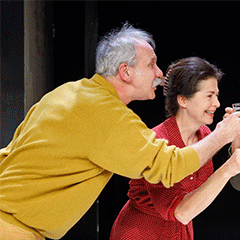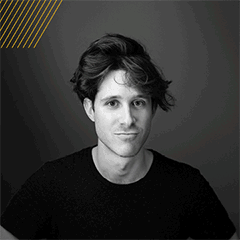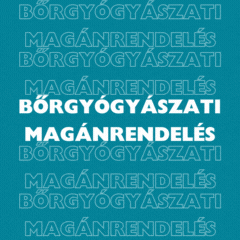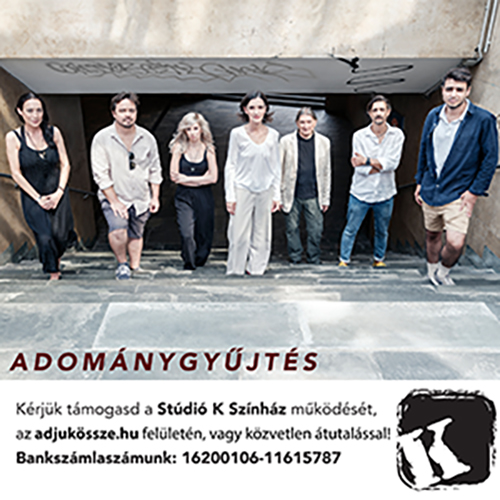I’m in a perpetual state of learning
In our upcoming project of American – Hungarian collaborations we would like to deal with the problem of how to approach the question of PC (political correctness) when it comes to the performing arts? More and more debates are centred around ”diversity” and how diversity appears in the performing arts: who are the performers, directors, writers? What about representation? How can we reconcilea esthetic freedom and the ethical need for diversity? Upor László talks with USA-based creators, theoreticians and university professors about these important, actual and difficult questions in our new series of interviews.
Gideon Lester, artistic director of the Fisher Center at Bard, in conversation with Laszlo Upor, dramaturg, translator and University Professor from Budapest
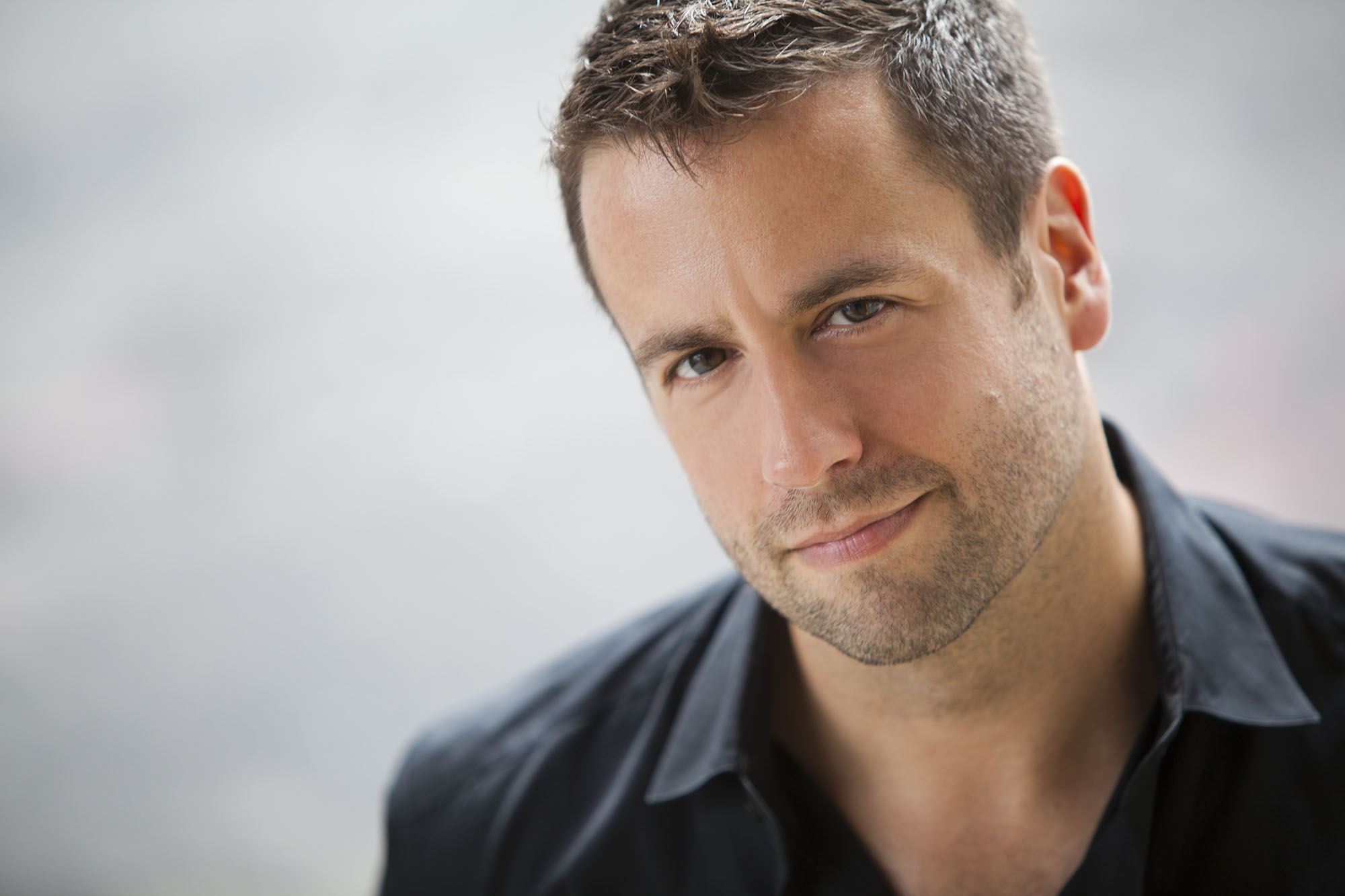
Gideon Lester. Photo: Kevin Thomas Garcia
László Upor: Have you ever been censored, banned, cancelled? As an educator or as an artist?
Gideon Lester: No I haven’t.
– Do you accept censorship in any circumstances? Can you imagine an instant when you’d subscribe to censorship?
– I would like the answer to be no. But I think it’s impossible to generalize. Because there’ll always be individual circumstances where a work of art is going to create such a violence or pain, that one should have a very serious conversation about whether this is the right moment to be showing it. I have never been in a position where I have had to cancel a project or where I have felt pressure on me to do that. And I hope it never happens.
– Have you ever felt so annoyed,so seriously insulted or offended that you thought ”No, this is impossible, they shouldn’t do this. They should be stopped.”
– I’m sure I have. But at the same time I’d like to think that the discomfort is productive. I mean there is bad art, or art that is stupid or boring.But then, also, I can leave. I don’t have to stay.
– You cannot ban the lack of talent, ban stupidity, bad art or bad taste.
– No. I mean, I can just choose to stand up and walk out. But I don’t have to take a totalitarian approach to that.
– How many languages do you speak? You’ve translated Marivaux, Büchner…
– I have relatively good French and German – I wouldn’t say that I’m fluent, but I feel comfortable translating them. I’m actually in the middle of a translation now, with a colleague who is a French scholar, of Molière’s Dom Juan, that we’ll be producing this summer at the performing arts centre that I run.
– What does language mean to you? A language other than your mother tongue. What is the role of a second /third language in your life?
– Let me answer that in a slightly oblique way. I am originally from the UK and I moved to the United States thinking I was coming for a single year for graduate school in dramaturgy. That was in 1995, and I’m still here. So, I would say, I’m aware of my position as both an insider and outsider and that that relates also to my origins. I’m Jewish, actually my grandfather was Hungarian.
– Do you speak any Hebrew?
– I don’t. I studied Hebrew but I don’t speak it. I think a lot about nuances of belonging and not belonging, and what it means to be an insider and not. And so, from that point of view, working in languages that are not my own has a particular interest. But what I’m really interested in is finding ways to represent both the strangeness and the familiarity of languages from other periods in English. Particularly, because I’ve always translated for an American audience here. I’m not primarily a translator, but for me to be translating for American actors is already an interesting aesthetic and intellectual exercise.
– We have a saying in Hungarian: ”You have as many cultures as many languages you speak”. Which, I believe, makes a lot of sense You cannot work with a different language without deeply-deeply understanding the culture it represents. And I wonder if that could be of great help: if you speak languages, those languages representing different cultures almost stop you from being racist because you are grown into those cultures.
– I certainly understand the point, but I don’t know whether I can make the same logical connection between understanding different cultures and therefore being free from racism. I grew up in a society that was monstrously racist, I mean in the UK. And I live in a country now that has a strong legacy of racism.
– Yes, but back then there were not too many people in the UK who spoke languages. And learning languages wasn’t exactly a national sport in the US.
– I don’t know about that. We all had to learn other languages. But they were Western European languages. They were not languages that brought us in contact with experiences of people from very different cultures, and certainly from cultures that had been, historically, oppressed. I wasn’t encouraged as a young British student to learn the languages of the Commonwealth, let’s say. French and German, absolutely. Some people were learning Chinese, that was considered, maybe, politically expedient. But to your point: if we took the time to learn languages of cultures very different from our own, I do think that it could deepen our curiosity and sense of empathy to people who come from a profoundly different experience from ours.
– What I really meant is that learning languages and studying different cultures is a very good exercise in inclusiveness and tolerance.
– Absolutely. And of course, both the cultures that I’ve lived in are pretty insular, and not so many anglophone Americans learn other languages. Increasingly, people are learning Spanish, which is just as well, since such a large segment of this country’s population is Spanish speaking, but we do have the disadvantage of speaking a language which is globally understood, unlike Magyar…
– And globally destroyed by all those people speaking English as a second language. This is our revenge for your dominating the language universe.
– I would not say destroyed.(laughs) I would say that the richness of English has always developed through contact with other cultures.
– So, you speak the language of the privileged. Still, being Jewish and, also, being ”an Englishman in New York” – have you ever felt discriminated as ”different”?
– Me? No. I mean, in London, yes, sure, when I was a kid, I experienced some antisemitism, but my memory is that it was pretty mild. No, no, no. I would say the opposite. I would say that I had just become more and more aware of my privilege. I think to be British in the States carries a completely undeserved currency. There is some mistaken belief that somehow just because we have this accent, we are also smarter. But I’m also very aware of the privilege of my education and of my skin colour, which is something that when I was growing up was invisible to me. And that invisibility itself is a mark of privilege. Because we grew up at a time when it was simply assumed, whether talking about theatre or other aspects of culture, that whiteness was the reigning paradigm. And white Britons had little ability at that time to understand how harmful this structure of misbeliefs was.
– Then you grew up to understand these privileges you were born into. It’s not your fault – it’s not anyone’s ”fault” – but still:have you ever felt any ”guilt” for being one of the privileged?
– I would not exactly call it guilt. For white people who are coming to terms with the legacy of racism, the learning process is difficult and absolutely necessary. I prefer not to focus on my own feelings but rather on what I can do to learn from the process of discovery and to help make change.
– And what can you do?
– I’m a teacher and a curator, an artistic director. I’m what they call a gatekeeper. The decisions I make have some small effect on American culture. And I can work hard – I must work hard – to make sure that the decisions that I’m making reflect the values of a society that I want to live in. And what that really mean is, I think, trying to cultivate a humility and to understand that the world that I grew up only gave me a very partial view. I studied English Literature at Oxford University before I came to the States. And for three years we did nothing but read great works of English literature from many different periods. And over the course of three years, I barely read the work of a single author who wasn’t white. And I know that this is now very different at Oxford, but at the time it didn’t seem strange. Now I’m looking back on it, and I’m appalled. Because I see it as part of a conscious or unconscious systemic movement to keep out voices that represent other experiences, other geographies, other positions in the power structure. So, what I was given was the education of an English upper-middle class gentleman, and that education system is designed to – again: consciously or unconsciously – maintain a status quo. And once you start to understand those dynamics, then I think you are obliged to question them. Because if you don’t question them, you are simply extending and exacerbating the status quo.
– As a gatekeeper – that’s what you’ve just called yourself – have you ever been criticised or attacked for not opening the gate wide enough or welcoming enough?
– There is a very healthy, lively and sometimes heated conversation in academia in the States at the moment about what is and what isn’t being taught. Our students are from a different generation and are rightly putting a pressure on us to introduce them to the work of artists and authors who represent a very broad range of experiences and backgrounds. And there have been moments of the twenty or so years that I’ve been teaching, that students would come to us as faculty and said: you’re not doing enough to introduce us to works outside the predominantly white western canon. And those moments are critically important. I really admire the outspokenness of these students because I look back again on my own experience as a student, and it would never have occurred to me to question orthodoxies of what I was being taught.
– Do you have this same argument with colleagues?
– There is an ongoing – sometimes quite public – conversation in the US about the construction of culture. The challenge is not always one person challenging another person. The challenge is in the form of a much broader cultural conversation. Because we are not islands. We don’t work in isolation. And one of the greatest benefits is that these experiences can change us and open us.
– In theatre we are even less isolated.
– I spent the first decade or so of my professional career working in a theatre. Focusing on theatre artists, including some from Hungary. And when I left that theatre, through a series of coincidences, I had the opportunity to start working with artists from other art forms I knew very little about. And so, I started moving into dance, live art and performance, contemporary music, working with visual artists and so on. And everything that I thought I knew about my own work – the kinds of artists that I wanted to support, the way that projects would develop and so on – started to shift, open up and expand. And that was very exciting. Venturing into a territory that was outside of what I thought was my comfort zone. Those are the happy opportunities to find that we are in a much richer, more complex, more surprising territory that we could possibly have imagined. This happens with me every time when I start working with another artist: I have to put aside all my assumptions of how we’re going to work, about what we’re going to make, about how it’s going to reach a public. It isn’t a kind of conveyer belt factory approach. Instead, it becomes a continuous process of renewal and change. And that’s fantastic. I classifythe kinds of cultural shifts we are talking about in a similar way. I’m in a perpetual state of learning, and hope to be able to offer new experiences to the publics for whom I’m programming.
– We expect everyone all around the world to be familiar with Chekhov and Shakespeare, but we don’t expect ourselves to know anything about, say, Chinese literary classics. There seems to be an agreement that ”Yes, Shakespeare is performed everywhere becausehe is global and he is all about the human condition”, and I wonder ifthere is any opportunity to try and find treasures in other cultures we could understand as just as universal as Shakespeare.
– I don’t know about universality. I guess I am a little bit suspicious of it as a goal.
– By ”universal” I mean “understood universally”, or all around the world, the same way Shakespeare should be understood by anyone living on this planet.
– Anything that we can do to broaden the texts, the cultural references, and voices that we are bringing forward in the world is extremely important. One only needs to think about the opera repertoire. There are probably something like twenty-five operas around the world that are regularly performed. And yet, there are hundreds of thousands that have been written. Why has the canon become so small and so exclusive? I think universality is now the realm of the internet and film and television, which have such broad systems of distribution, rather than our strange little profession.
– Maybe it’s not a goal at all. I didn’t only mean theatre, of course. What I meant was that it’s axiom – a strange one– in our mind that there are some brilliant authors, some artists whom we think would speak to every single citizen of our global village – and those are “by chance” the ones from Europe and Northern America.
– Well, I’m not sure that that’s by chance, I think that is clearly a product of colonialism.
– It was my weak attempt on being ironic. Sorry.
– I think the task now is to at least become conscious of the forces, that perhaps have been not sufficiently visible in the past, that have led to certain works always being performed at the expense of else. We recently started a Center for Human Rights and the Arts here at Bard College, where I work. We have a graduate program that brings together artists and activists from all over the world. And the first cohort of students comes from China, Russia, Palestine, Jordan, Egypt, Columbia. It’s just extraordinary to be in a room with people of great accomplishment who are united by the desire to study together. It breaks the spell of the myth of universality. The idea of universality is easy if you are sitting in a colonial centre disseminating culture to the provinces but has actually little to do with the experience of most people on the planet. Which is not to say that we shouldn’t teach Shakespeare or shouldn’t stage Chekhov. But we have to find ways to open up cultural institutions to much broader ways of exposing the world through the choices we’re making.
– Once you find the treasures, once you have the people who represent different cultures, then you suddenly have lots of news stories, or old stories told a different way. Representation and exploration of a much wider cultural spectrum, I think, is a desire many of us share. But then we face the question which, again, is widely discussed: whose story is this to tell? Who are entitled to tell a story? All sorts of questions about authenticity, fair representation, political correctness etc. must be responded to. Should Othello always be played by a Black actor, should Prior Walter of Angels in America be played by a gay actor, should women be played by women and men by men?
– My only answer to that is to be awake as possible and as conscious as possible to the impact of the choices we’re making in the places that we’re making the choices. I would say in the US now there is no question that Othello cannot be played in blackface anymore. We’ve moved so far beyond that. I can’t speak about Hungary.
– We don’t have Black actors, you know. But we don’t do blackface. Othello is played by a white actor, and we all understand in the auditorium that he’s a moor.
– The context is completely different, of course, now in the States. But I’ll give you a counterexample which is this production of Molière’s Dom Juan that we’re staging this summer. Dom Juan and Sganarelle will be played by women. The production is being directed by a woman. As far as I can tell it, this is the first time a woman has directed this play, which is such a “male” play. And the director and I are really interested in what will happen to the power-dynamics in this play if Dom Juan, this icon we think of as such an expression of male power, is played by a woman. We don’t know the answer to that question, but I’m certain that it will open up the play in ways that are unpredictable and fresh. In American context it’s not so interesting to put on yet another production about a man with power. So, I think we’re going to use the stage as a place to ask questions and to experiment with ideas.
– Some years ago,I taught a whole semester of various Don Juan versions across centuries. For the exam, the students had to write an essay on why in this arch story the main characters always a man and why there is no attempt on doing it with a woman in the centre? And all of them, male and female alike – all but one – claimed that the things Don Juan represents and does would be unaccepted from a woman. Where Juan may be, according to them, seen a brave explorer, Juanita would be called a whore. I tried to hide how baffled I was and suggested the group to discuss the arrogance and chauvinism of the character. Right after I left the room, I learned about accusations of one of our respected professor’s alleged abusive behaviour decades earlier. I wonder if the students later suspected that I had known about the case and that is why I orchestrated the whole debate. I didn’t.
– The U.S. Supreme Court is going to decide whether it will overturn the federal right to abortion just a week before the premiere of our production. And so, it’s a moment where a fundamental question of women’s right to self-determination of their bodies is, unbelievably, being asked again. In a country that prides itself on being the freest in the world. How then a production of Dom Juan in which the character is played by a woman is going to resonate we don’t know. But I do know, as you do, that theatre can resonate differently every day. And so somehow this ability of theatre to reflect and refract what’s taking place in the world around it is something that we, of course, have to remain very attuned to. In other words, I think the questions you’re asking about representation are just a tiny piece of a much larger idea, inherent in theatre, of the way that it creates resonances and dialogues with its audiences.


